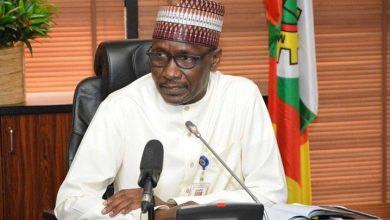FG Laments Rising Drug Trafficking Via Sea

The Minister of Marine and Blue Economy, Adegboyega Oyetola, has expressed concern over the rising incidents of drugs and human trafficking, threatening the maritime sector, The Courage.
Oyetola stated this on Thursday in Lagos at a maritime security conference organised by the Maritime Security Providers Association of Nigeria and Alumni of the Maritime Academy of Nigeria.
The event was themed, “Drugs & Human Smuggling/Trafficking: The Evolving Maritime Security Threats to Ships and Seafarers.”.
Oyetola, represented at the event by the Director of Marine Environment Management at the Nigerian Maritime Administration and Safety Agency, Mr Heaky Dimowo, stated that those activities were eroding the country’s social fabric, destabilising communities, and challenging the law enforcement at sea.
They pose a significant risk to the maritime security of seafarers and vessels. Today, we must confront the fact that our waters are increasingly viewed as a transit route to illicit activities,” he noted.
According to Oyetola, Nigeria must develop a comprehensive strategy to address these evolving threats by leveraging technological innovations, enhancing its intelligence capabilities, and fostering collaboration among critical stakeholders.
“Together, we can develop multifaceted responses that effectively combat these challenges,” the minister said.
In his paper presentation, the Director of Operations, at Pacific Basin Shipping Limited, Hong Kong, Mr Suresh Prabhakar, urged the National Drug Law Enforcement Agency to review its stance when drugs are found on board ships, as shipowners in most drug bursts do not have any connection to the importation of the drugs.
Prabhakar mentioned that between February 2021 and July 2024, a troubling trend emerged in Lagos, as four bulk carriers laden with sugar from Santos, Brazil, became embroiled in drug-related incidents that had far-reaching consequences for the shipowners and the crew members.
“Each of these ships was found to have significant quantities of cocaine on board, ranging from 18 to 43 kilogrammes, leading to prolonged detentions by the NDLEA,” he narrated.
According to Prabhakar, each ship faced delays of four to six months while investigations were carried out, only to be released after the owners posted substantial bonds, ranging from $2m to $5m.
He said that on average, 10 crew members per ship were detained, and their bail was set at $40,000 per person, allowing them to stay in a hotel instead of a detention facility.
“This bail money, totalling $400,000 for 10 crew members, did little to alleviate the psychological and emotional toll of their extended detention,” he explained.
He maintained that the situation had been dire for crew members on two of the ships, who were detained for approximately 20 months before being released after numerous court hearing “For the remaining two ships, the crew members are still detained in Lagos, with their court cases ongoing,” he said.
Prabhakar said one crew had been in detention for 34 months, while the other had endured 13 months of confinement.
“The mental and physical scars such incidents leave on crew members and their families are immense. Careers are often destroyed, leaving many families in severe financial and emotional distress.
“The financial burden on ship owners is also significant. Beyond the bonds and legal costs, they must cover the crew’s salaries and the upkeep of their families during these extended detentions. The impact on the industry is profound, as owners are forced to reconsider trade routes to avoid the risk of similar incidents.
“Such cases adversely impact the ability of ship owners to engage in such trades,” the insider added. “Several owners and operators are now choosing alternative trade routes,” he noted.
Prabhakar stated that given the significant risks of drug smuggling on board ships and the challenges faced by crews and ship owners, there were growing calls for the NDLEA to reconsider its stance.
“It would be prudent for the NDLEA to adopt similar practical measures as in the USA, Europe, and Brazil. This would prevent unnecessary delays for ships and crews when drugs are found on board, as the consequences for them are very dire.” He said
According to the President of MASPAN, Emmanuel Maiguwa, drug smuggling and human trafficking are transnational crimes that exploit the points of origin and destination, and maritime transport provides the mobility needed to actualise those illicit crimes.
Maiguwa said that records from the United Nations Office on Drug and Crime had shown that West Africa was a transit region for narcotics, mostly emanating from South America.
“With recent incidents involving merchant ships (excluding cases of drugs concealed in cargo containers) from South America to Nigeria rising to about four within the last two years, this maritime corridor proves to be providing mobility for this illicit activity.
“On the issue of human trafficking, records from Africa Risk Compliance show a significant number of incidents where stowaways have been discovered on ships calling Nigerian ports. Take note that these are discovered cases only,” he asserted. Maiguwa said that both MASPAN and AMANO were in support of the fight against all forms of trafficking and smuggling, including drugs and humans.




